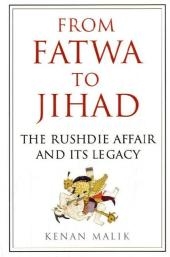
From Fatwa to Jihad
How the World Changed: The Satanic Verses to Charlie Hebdo
Seiten
2009
|
Main
Atlantic Books (Verlag)
978-1-84354-823-2 (ISBN)
Atlantic Books (Verlag)
978-1-84354-823-2 (ISBN)
- Titel ist leider vergriffen;
keine Neuauflage - Artikel merken
On the eve of the 20th anniversary of the Rushdie fatwa, this title tells the story of this defining episode and explores its repercussions and resonance through to contemporary debates about Islam, terror, free speech and Western values. It examines how the Rushdie affair transformed the nature of the debate on tolerance and free speech.
When a thousand Muslim protestors paraded through a British town with a copy of Salman Rushdie's The Satanic Verses before ceremoniously burning the book it was an act motivated by anger and offence as well as one calculated to shock and offend. It did more than that: the image of the burning book became an icon of the Muslim anger. Sent around the world by photographers and TV cameras, the image announced a new world. Twenty years later, the questions raised by the Rushdie Affair - Islam's relationship to the West, the meaning of multiculturalism, the limits of tolerance in a liberal society - have become some of the defining issues of our time.
Taking the Ayatollah Khomeini's fatwa as his starting point, Kenan Malik examines how radical Islam has gained hold in Muslim communities, how multiculturalism contributed to this, and how the Rushdie affair transformed the very nature of the debate on tolerance and free speech.
When a thousand Muslim protestors paraded through a British town with a copy of Salman Rushdie's The Satanic Verses before ceremoniously burning the book it was an act motivated by anger and offence as well as one calculated to shock and offend. It did more than that: the image of the burning book became an icon of the Muslim anger. Sent around the world by photographers and TV cameras, the image announced a new world. Twenty years later, the questions raised by the Rushdie Affair - Islam's relationship to the West, the meaning of multiculturalism, the limits of tolerance in a liberal society - have become some of the defining issues of our time.
Taking the Ayatollah Khomeini's fatwa as his starting point, Kenan Malik examines how radical Islam has gained hold in Muslim communities, how multiculturalism contributed to this, and how the Rushdie affair transformed the very nature of the debate on tolerance and free speech.
Kenan Malik is a writer, lecturer and broadcaster. He is a Visiting Senior Fellow in the Department of Political, International and Policy Studies at the University of Surrey. He is a presenter of Nightwaves on Radio 3 Analysis on Radio 4. He has also written and presented a number of radio and TV documentaries. His books include The Meaning of Race (1996), Man, Beast and Zombie (2000) and Strange Fruit: Why Both Sides are Wrong in the Race Debate (2008).
| Erscheint lt. Verlag | 1.4.2009 |
|---|---|
| Verlagsort | London |
| Sprache | englisch |
| Maße | 165 x 240 mm |
| Gewicht | 297 g |
| Themenwelt | Geschichte ► Allgemeine Geschichte ► Zeitgeschichte |
| Geisteswissenschaften ► Religion / Theologie ► Islam | |
| Sozialwissenschaften ► Politik / Verwaltung | |
| ISBN-10 | 1-84354-823-2 / 1843548232 |
| ISBN-13 | 978-1-84354-823-2 / 9781843548232 |
| Zustand | Neuware |
| Haben Sie eine Frage zum Produkt? |
Mehr entdecken
aus dem Bereich
aus dem Bereich
Gewalt, Umwelt, Identität, Methode
Buch | Softcover (2024)
Spector Books OHG (Verlag)
CHF 49,95
wie Freud im Kollektiv verschwand
Buch | Hardcover (2024)
Klett-Cotta (Verlag)
CHF 34,95


